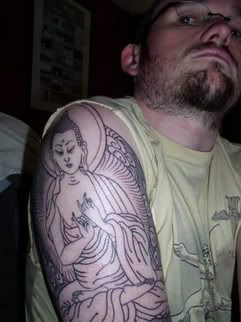Robinson Crusoe
In the spirit of getting back in touch with childhood I am currently reading "Robinson Crusoe" by Daniel Defoe. Unfortunately, also in the spirit of childhood, it is pretty clear within about 10 pages of starting this book that the version of the story you heard as a kid was edited quite significantly.
The first thing that strikes you about Robinson Crusoe is that the main character is a complete eejit. The whole first section of the book is dedicated to people telling him not to go to sea because he'd need a life-jacket to step in a puddle.
He disregards his Father's advice and sets sail. Only he doesn't set sail for the tropics, he sets sail from Hull to London and almosts gets shipwrecked off the coast of Norwich.
As if this wasn't an omen enough, a succession of world weary sailors refuse to sail with him, mainly because he is walking bad luck and his lack of care for parential advice gives them the willies.
Eventually he finds one poor sap and they sail off to the coast of Africa where he makes a wee bit of money, enough to give him a buzz and make him try again.
The next voyage is not so sucessful because he gets captured by pirates and become a slave of the Moors in Morocco. He sticks this out for a few years before escaping in a small boat with "his boy Xory".
This is when you really start to realise how edited the story was when you were a kid. His escape along the coastline of Africa is filled with references to "savages" and "negros" and of course, "his boy".
It's hard to scream racism as it is obviously a reflection of the attitudes of the time when the book was written (first published in 1719) but it makes for some uncomfortable reading.
Anyway, eventually he gets rescued by a Portugese ship and escapes to Brazil. Along the way he sells "his boy Xory" to the Portugese captain with the explicit agreement that Xory shall be set free when his 10 years of slavery are done!
Yay! Thanks a lot Mr Crusoe!!
This has all happened and the eejit isn't even marooned on the island yet. This is also as far along in book I am at the moment so I can't comment on the second half but I'm sure it will be interesting.
I did however go and look up Alexander Selkirk on wikipedia. This is the Scotsman that Defoe is supposed to have based his story on. It seems that Selkirk was a lot brighter than Defoe's character as he actually "volunteered" (not sure if that is the right word) to stay on his island as he was doubtful about the sea-worthiness of the vessel he was travelling on. Turns out he was right and the ship sank a while later with the loss of most hands.
If only Robinson had the same amount of sense.
It has reminded me of an old Scottish joke though:
A guy walks up to the bar to buy a pint. There is a guy sitting on one of the barstools doing the crossword in the newspaper.
Crossword guy looks up and says "8 letters, it means stuck on a desert island"
The other guy says "It's marooned"
First guy says "Thanks a lot, I'll have a pint of Guinness please!".

